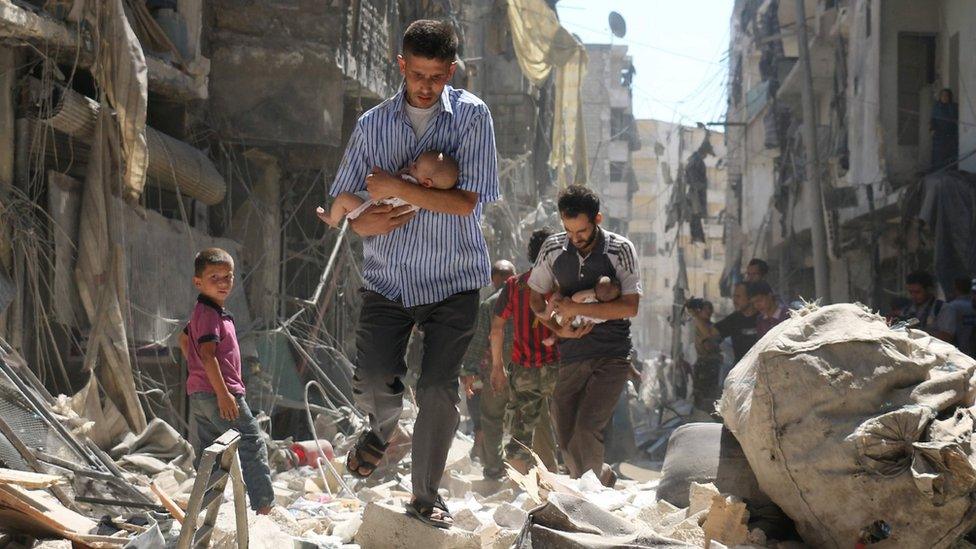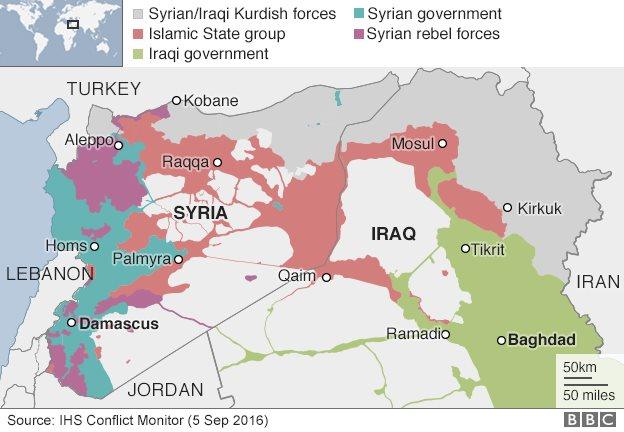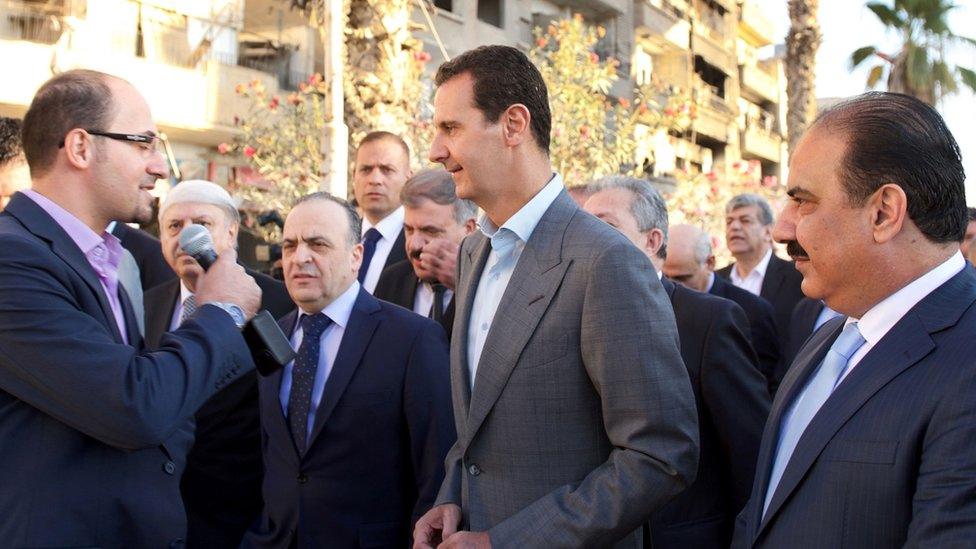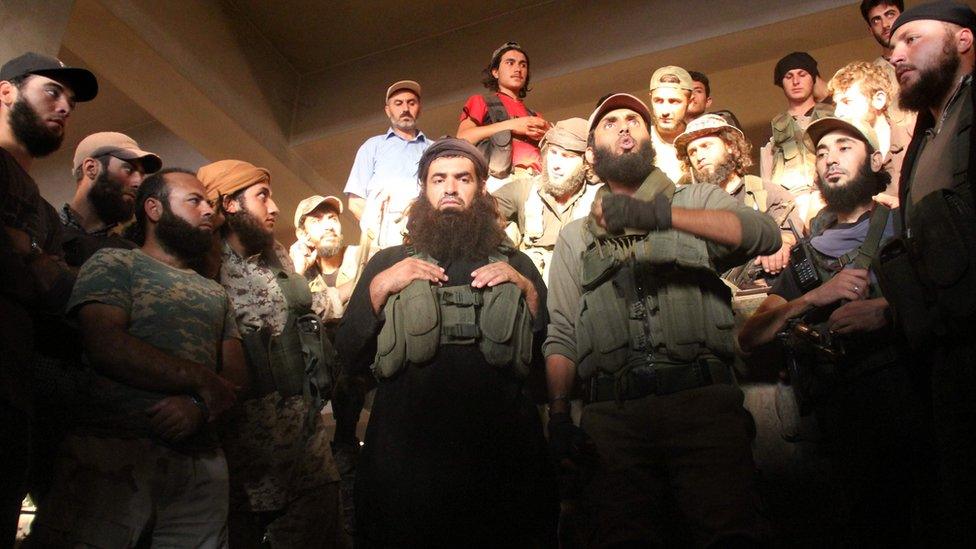Syria conflict: How will the new truce work?
- Published

More than 2,000 people have been killed in fighting over the past 40 days in Aleppo
A partial truce brokered by the US and Russia in Syria came into effect at sunset on Monday, the beginning of the Islamic festival of Eid al-Adha.
If successful, it will see President Bashar al-Assad's forces ending air strikes on territory controlled by mainstream rebels, and both sides allowing humanitarian access to besieged areas.
It will also lead to co-ordinated air strikes by the US and Russia against two UN-designated terrorist organisations - so-called Islamic State and the rival jihadist group Jabhat Fateh al-Sham, which was known as al-Nusra Front until it broke off formal ties with al-Qaeda in July and changed its name.
The Syrian government has given its backing, but a number of rebel groups have expressed strong reservations and have yet to say whether they will abide by it.

What has been agreed?
John Kerry: "If this arrangement holds then we will see a significant reduction in violence across Syria"
The US and Russia back opposing sides in Syria's five-year civil war, which has left more than 250,000 people dead and displaced more than 11 million others.
After 10 months of negotiations that the US said were marred by deep "mistrust", US Secretary of State John Kerry and Russian Foreign Minister Sergei Lavrov announced, external on Saturday that they had reached an agreement on a "sustainable" cessation of hostilities that would facilitate negotiations on a political settlement.

The deal, which begins with a 48-hour renewable truce, involves three phases:
The Syrian government will stop flying combat missions "anywhere where the opposition is present". Mr Kerry said the government would no longer be able to use the claim that it was bombing Jabhat Fateh al-Sham fighters to mask attacks against "legitimate" rebels operating in the same areas
Both sides will be required to allow unimpeded and sustained humanitarian access to all besieged and hard-to-reach areas. A priority will be the second city of Aleppo and its surroundings, where as many as two million people live. Government and rebel forces will pull back from the Castello Road, a major artery running around the north of the city into the rebel-held east. They will also provide safe access through the south-western Ramouseh Gap area
Providing there are seven consecutive days of significantly reduced violence and humanitarian access, the US and Russia will work together to "develop military strikes" against Jabhat Fateh al-Sham and IS. A Joint Implementation Centre will be established to share information necessary for the delineation of territories controlled by jihadist and rebel groups in areas of active hostilities


What do the government and opposition say?

Ahead of the truce, Bashar al-Assad said the armed forces would be "continuing their work"
Mr Lavrov said the Syrian government, which Russia has supported with hundreds of air strikes over the past 11 months, was "ready to fulfil" the arrangements.
But hours before the truce started, President Assad proclaimed his determination to "recover every area from the terrorists", a term he has used to describe all armed opponents.
The main umbrella group representing political and armed opposition factions, the High Negotiations Committee, meanwhile said it wanted "guarantees" on the implementation of the truce deal before endorsing it.
Aleppo: Key battleground in Syria's civil war
The Western-backed Free Syrian Army said rebel groups fighting under its banner would "co-operate positively" with the truce, but were concerned that it would benefit the government.
The hardline Islamist group Ahrar al-Sham condemned the agreement as an effort to drive rebel factions apart, but stopped short of explicitly rejecting it outright.
Jabhat Fateh al-Sham spokesman Mostafa Mahamed meanwhile stressed that the group's fighters shared the same goals as the rebels, and were "deeply embedded in society and cannot be singled out in any way".
"They don't govern an area on their own. They are not exclusive to any particular location. America and Russia know this very, very well," he told the BBC.

Can it succeed?

The US has warned mainstream rebels to separate themselves from Jabhat Fateh al-Sham
Mr Kerry stressed that he and Mr Lavrov had worked very hard to ensure they were not repeating the mistakes of previous truces, which have collapsed within days or weeks with both sides accusing each other of repeated violations.
During the short-lived cessation of hostilities negotiated by Washington and Moscow in February, Syrian government forces had continued to indiscriminately bomb opposition-held areas, meaning rebel forces had felt compelled to return fire, Mr Kerry said.
The "marbleising" of mainstream rebels and Jabhat Fateh al-Sham fighters on the ground had also sown confusion, he added.
This time, in theory, Russia will ensure the Syrian air force stops bombing opposition territory altogether and the US will be able to "delineate and separate" rebels and jihadists.
White House press secretary Josh Earnest acknowledged that the success of the agreement "places a lot of pressure on Russia to deliver".
Many Syrians and foreign observers also doubted whether mainstream rebels would or could distance themselves from Jabhat Fateh al-Sham's fighters.
"They are an effective fighting force," Michael Stephens of the Royal United Services Institute told the BBC. "It makes no sense to peel away from them because what you are doing is weakening your own position by doing that."